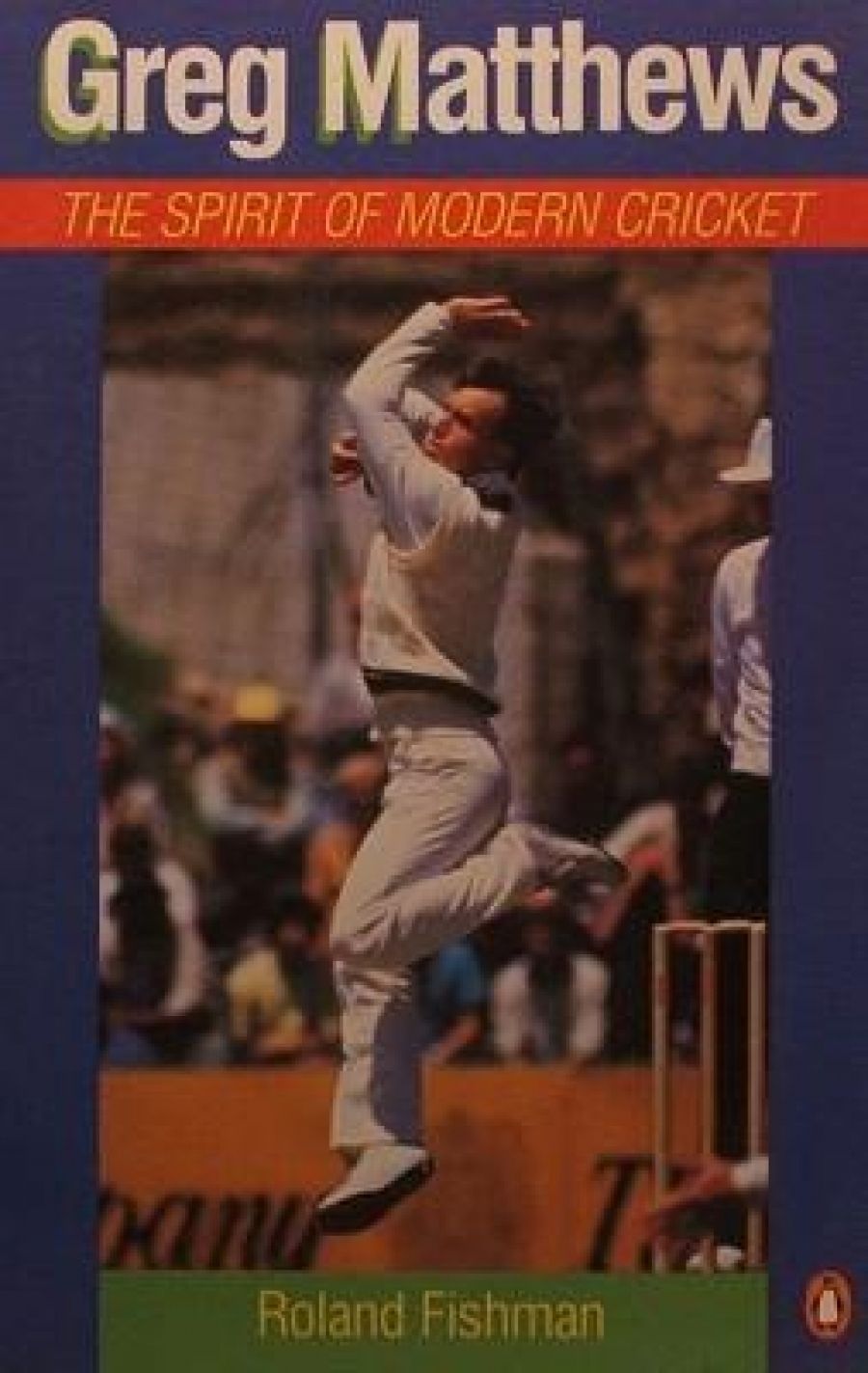
- Free Article: No
- Contents Category: Cricket
- Review Article: Yes
- Article Title: The Spirit of Modern Youth
- Online Only: No
- Custom Highlight Text:
I write this review the day after the Fifth Test. Australia has finally won one. I personally wouldn’t give two squirts of goat shit for the Australian selectors but this time they can tell us what to do with our cricket bats. Peter Taylor has taken six for and two for, batted with determination, and won the man of the match. (A shocking decision, by the way. It was Jones, then daylight, then Taylor and Emburey, and I don’t like Victorian batsmen and Poms who played in South Africa.) Twelfth man for Australia was Greg Matthews, who bowls off-spin and bats with determination. Like Taylor, whom Matthews would no doubt call ‘the man’ at the moment. Does this mean Matthews is on the way out, and that Roland Fishman’s mid-career biography, Greg Matthews: The Spirit of Modern Cricket, is one of the sillier Penguins, a book destined to become as popular as Andrew Jones’s autobiography? (Remember Andrew Jones, the oncer in the federal parliament in the mid-sixties? The relevant tome used to be on sale at Mary Martin’s at ten cents, two copies five cents …)
- Book 1 Title: Greg Matthews
- Book 1 Subtitle: The Spirit of Modern Cricket
- Book 1 Biblio: Penguin, 184 pp, $6.95 pb
A qualified ‘no’ to both questions, since you’re twisting me spinning finger behind me back. To begin with Matthews, the book itself begins on 11 November 1985, with Australia 5/67 in the second innings against New Zealand and needing another 300 odd to avoid an innings defeat. Enter Matthews to score his first Test century, accompanied by air-punching, love to Jillian, kisses to Mum, etbloodycetera. Notice not the familiar position Australia is in, or the self-indulgence of (some of) Matthews’s antics, but the fact that he’s able to indulge at all, given his failures against the West Indies in 1984–85 and his dismal tour of England immediately following. In other words, the real point about Matthews (and the antics) is that he’s irredeemably enthusiastic; and what this means is that he has the determination, old-fashioned guts, to fight back. Which perhaps allows one to predict that although the Taylor star might be at the moment in the ascendancy, Matthews will be back. Besides, he’s our best field.
As for the book, it’s been criticised for having been written too early, before Matthews has done as much as, say, Thommo and Border, whose own autobiographies hit the streets at around the same time as Fishman’s study. And yet there’s no reason why those cricketers’ books we all have on our shelves – mine own, for a start, include Bill Lawry’s Run Digger and Davo’s Fifteen Paces – should be the old familiar mixture of early days, career highlights, photographs of meeting the Queen, and the settling of one or two old scores (at least in more recent examples). Not that Fishman, with his repeated references to Mr Nolan, Greg’s coach and inspiration, completely undermines the genre, but there is about his study of Matthews a freshness of approach. It doesn’t follow a strictly chronological approach, there is an attempt at analysis in preparing which Fishman has usefully sought assistance from a range of informants (antagonists as well as males, ladies as well as the fellas), and there is a sense of immediacy which derives in part from Fishman’s adroit – and at the same time mocking – use of television commentary. On the other hand, one gets the impression that Mr Fishman is almost as laid back as Mr Matthews, certainly in his attention to some of the facts, of which Holland described as an off-spinner takes first prize. Also, the book is wrongly subtitled: Matthews might be the spirit of modern youth, but his cricket is old-fashioned – and what we used to call Australian.
In sum, then. A bit cute in parts, but a shrewdly structured combination of career significances, atmosphere and discussion. A pretty good read, and well worthwhile having beside you during those bloody Ingham’s chicken ads (at least in Canberra).


Comments powered by CComment